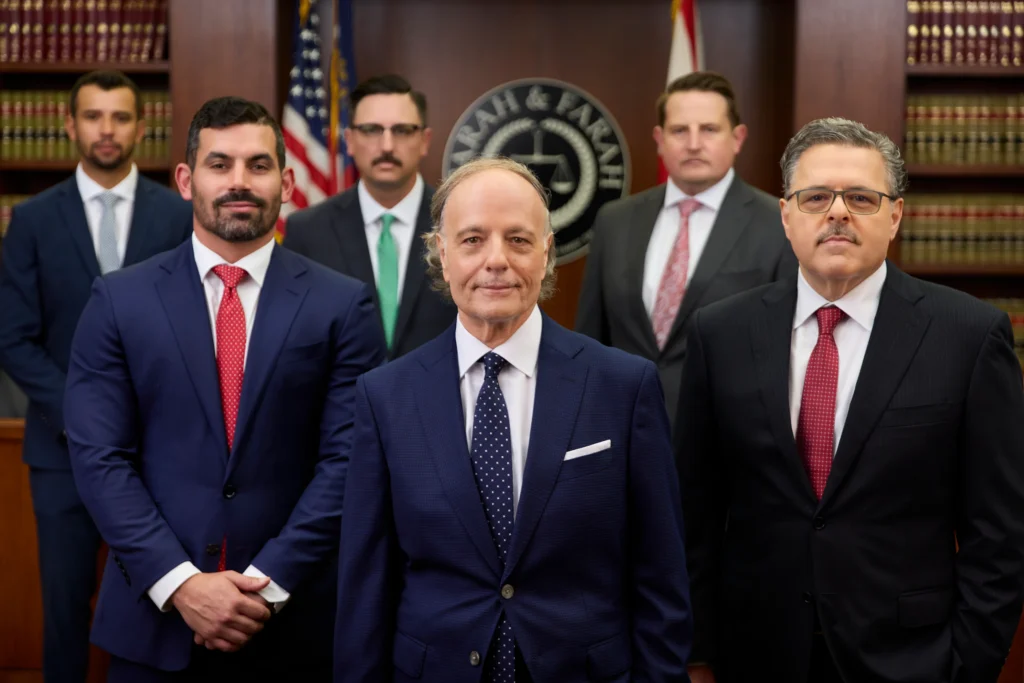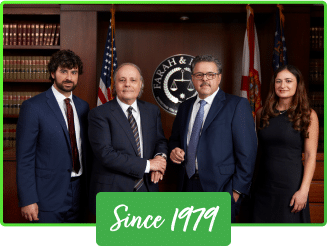Civil Rights Discrimination Attorneys
A civil right is a legally protected right that ensures equal access to social opportunities, legal protections, and fair treatment in the workplace and beyond. These rights are essential for guaranteeing equality and justice in society, protecting individuals from discrimination in all aspects of life, including employment.

FREE CASE REVIEW
Home > Labor Law Attorneys > Civil Rights Discrimination Attorneys
What Are Civil Rights?
Rooted in the United States Constitution, as well as federal and state laws, civil rights encompass protections such as the right to a fair trial, freedom of speech, religious freedom, and the right to work without facing discrimination based on race, age, gender, religion, or other personal attributes. Civil rights aim to promote fairness and safeguard individuals from unjust treatment, ensuring that everyone has the opportunity to thrive in a just and equitable environment.
The Importance of Civil Rights
When an individual experiences unfair treatment or discrimination based on characteristics such as race, age, gender, religion, or other personal attributes, it constitutes a violation of their civil rights. Such violations undermine the principles of equality and justice that civil rights are designed to uphold.
How Farah & Farah’s Civil Rights Attorneys Can Help You
Our team is here to help navigate the intricacies of civil rights law, ensuring that your rights are fully upheld and protected. Whether you are facing discrimination in the workplace, seeking to understand your rights, or need legal support, Farah & Farah’s experienced attorneys are ready to assist you in achieving justice.
What Do Civil Rights Attorneys Do and Why Are They Important?
Civil rights attorneys play a crucial role in seeking justice for individuals whose civil rights have been violated. Their work involves interactions with both law enforcement and private entities, including workplaces. Individuals from all backgrounds depend on them for protection against discrimination based on gender, sexual orientation, race, and religion, as well as for helping ensure enforcement workplace discrimination laws. Their work upholds the intent of civil rights laws, ensuring that every individual has access to legal representation.
Knowledge in Civil Rights Law
Our attorneys possess a deep understanding of civil rights law, ensuring you receive the best possible representation. We stay updated on the latest legal developments and precedents to provide effective and well-informed advocacy.
Personalized Legal Strategy
We develop customized legal plans that are specific to the details of your case, increasing the likelihood of a favorable outcome. Our approach is designed to address your unique circumstances and legal needs.
Investigating Your Case
Our attorneys conduct thorough investigations to gather evidence and build a strong case on your behalf. We work meticulously to uncover the facts and make sure your voice is represented. This process includes interviewing witnesses, examining documents, and consulting experts as needed.
Filing Complaints and Lawsuits
We assist in filing complaints and representing you in court if necessary. Our goal is to hold those responsible for civil rights violations accountable and secure justice for you. We handle all aspects of the legal process, from drafting and filing legal documents to arguing your case in court.
Negotiating Settlements
In certain situations, we negotiate settlements to resolve disputes without the need for extended litigation. Our goal is to settle your case efficiently while fully protecting your rights.
Representing You in Court
If your case goes to trial, our attorneys will represent you in court, presenting evidence, questioning witnesses, and making legal arguments on your behalf.
Protecting Your Rights Post-Trial
Even after a trial or settlement, issues may arise that require legal attention. Our attorneys can help enforce court orders, address non-compliance by the other party, and provide ongoing legal support to protect your rights.
What Is the Civil Rights Movement?
From the mid-1950s to the late 1960s, the Civil Rights Movement sought to end racial segregation and discrimination against African Americans and other marginalized groups. Through protests such as marches and sit-ins, leaders including Martin Luther King Jr. and Rosa Parks mobilized public support and pushed for legislative changes. This movement led to significant achievements, including the Civil Rights Act of 1964 and the Voting Rights Act of 1965, which continue to promote equality and protect civil rights in the United States.
The Civil Rights Act of 1964
In 1964, Congress passed a public law prohibiting discrimination based on race, color, religion, sex, or national origin. This landmark legislation included provisions that made it illegal to discriminate in public places and federally funded programs. The Act also banned discrimination in hiring, promoting, and firing employees, reinforced the protection of voting rights, and mandated the desegregation of schools.
Equal Employment
This provision prohibits employment discrimination based on race, color, religion, sex, or national origin, ensuring fair hiring, promotion, and termination practices. The Equal Employment Opportunity Commission (EEOC) is responsible for enforcing these protections and addressing complaints of workplace discrimination.
Public Accommodations
This Civil Rights Act provision prohibits discrimination in public places such as restaurants, theaters, hotels, and motels, ensuring equal access to facilities and services for all individuals.
Federally Assisted Programs
This section of the Civil Rights Act prohibits discrimination by government agencies and organizations that receive federal funding.
Desegregation of Public Education
The federal government is authorized to file lawsuits enforcing the desegregation of public schools, ensuring that all students have equal access to education.
Voting Rights
Discriminatory practices that could prevent citizens from voting are banned across the country. Measures are included to stop voter suppression and disenfranchisement, ensuring all eligible voters can participate in elections.
Judicial Enforcement
This provision simplifies the process of transferring civil rights cases from state courts to federal courts. This ensures a more consistent and fair trial process, as federal courts are better suited to address civil rights issues impartially across different states.
The Impact and Legacy of the Civil Rights Act
The passing of this Act was a significant milestone in the civil rights movement, resulting in stronger legal protections and helping dismantle systemic discrimination. It laid the foundation for future legislation and continues to serve as a vital tool in promoting equality and justice in the United States in the workplace and other areas of life.
Civil Rights Today
Civil rights are continually evolving to address new challenges and ensure that equality and justice are maintained in today’s modern society. As our understanding of civil rights broadens, so do the protections and legal frameworks established to uphold them. In the modern era, civil rights cover a wide range of issues, highlighting the complexity and diversity of contemporary society.
Disability Rights
The Americans with Disabilities Act (ADA) of 1990 bans discrimination against individuals with disabilities. It guarantees equal access to employment, public facilities, transportation, and communication. Current efforts continue to enhance accessibility and promote inclusion in every aspect of their life.
Voting Rights
Voter suppression efforts, especially against minority communities, can persist despite the progress made since the Voting Rights Act of 1965. Modern challenges include securing accessible voting systems, and protecting against discriminatory laws and practices that disenfranchise voters.
Immigrant Rights
The rights of immigrants, particularly those who are undocumented, remain a highly debated issue. Key elements of the modern civil rights movement include advocating for fair treatment, protection against unlawful detention, and access to legal representation. The Deferred Action for Childhood Arrivals (DACA) program, introduced in 2012, provides temporary relief from deportation and work authorization for eligible undocumented youth.
LGBTQ+ Rights
In recent years, there have been major advancements in acknowledging and protecting the rights of LGBTQ+ individuals. The Supreme Court’s 2015 ruling in Obergefell v. Hodges which legalized same-sex marriage across the country, was pivotal. Despite these victories, efforts to combat discrimination against these communities in employment, housing, and healthcare persist.
Criminal Justice Reform
Modern civil rights advocacy focuses on tackling systemic racism and inequities in the criminal justice system. Key efforts involve reforming policing practices, reducing mass incarceration, and ensuring fair treatment for all individuals. High-profile cases of police brutality have sparked nationwide movements demanding accountability and reform.
$2+ BILLION IN RESULTS

The Role of Civil Rights Attorneys
Civil rights lawyers are essential advocates for justice and equality, tackling issues ranging from defending marginalized communities to challenging unjust laws and practices, including in the workplace. Their work encompasses a variety of activities, including but not limited to:
- Legal support: Offering guidance to those who have experienced civil rights violations
- Litigation: Representing clients in court to contest discriminatory actions
- Mediation: Facilitating negotiations between parties to resolve disputes and avoid prolonged litigation
- Policy advocacy: Collaborating with lawmakers to create equitable legislation
- Community education: Informing individuals about their rights and how to safeguard them
Understanding Civil Rights Laws
Federal civil rights laws protect individuals from discrimination and ensure equal treatment under the law. These laws apply nationwide and set a standard of protections that states must follow. In addition to federal laws, each state has its own civil rights laws that offer additional protections to meet the specific needs of its residents. These state laws often complement federal laws and address local issues that may not be included in national legislation.
Civil Rights in Florida
Florida has enacted several state laws to protect the rights of its residents. These state-specific laws, along with federal civil rights protections, help ensure that individuals in Florida are protected from discrimination and have equal opportunities in various aspects of their lives. Here are some key civil rights addressed in the state of Florida:
Florida Civil Rights Act
This legislation bans discrimination based on race, color, religion, sex, pregnancy, national origin, age, disability, or marital status in areas such as employment, housing, and public accommodations. Its purpose is to ensure equal opportunities and to prevent discriminatory practices in various aspects of everyday life in Florida.
Florida Whistleblower's Act
This law protects employees from retaliation when they report illegal activities or misconduct within their organization. It encourages the reporting of unlawful practices by assuring individuals that they can come forward with information without the risk of losing their jobs or facing other negative repercussions.
Florida Victim's Rights Act
This legislation grants specific rights to crime victims, such as the right to be informed, present, and heard at various stages of the criminal justice process. It ensures that victims are treated with fairness and respect, and that their voices are heard in legal proceedings.
Florida Hate Crimes Act
This law increases penalties for criminal offenses that are found to be driven by prejudice related to race, color, ancestry, ethnicity, religion, sexual orientation, national origin, homelessness, disability, or advanced age. It aims to deter hate crimes and offers additional legal recourse for victims to seek justice.
State Civil Rights Laws in Georgia
Georgia has also enacted several state-specific laws to protect the civil rights of its residents. Here are some key laws that apply specifically to the state of Georgia:
Georgia Fair Employment Practices Act
This law forbids discrimination in public employment based on race, color, religion, sex, disability, or national origin. It ensures equal opportunities for all individuals and prevents discriminatory practices in public employment.
Georgia Whistleblower Act
This statute protects public employees from retaliation when they report misconduct, fraud, or illegal activities within government agencies. It promotes transparency and accountability by protecting individuals who disclose unlawful practices.
Georgia Equal Employment for Persons With Disabilities Code
This legislation protects individuals with disabilities from employment discrimination. It ensures equal workplace opportunities and mandates that employers provide reasonable accommodations for employees with disabilities.
Georgia Age Discrimination Act
This law prohibits age-based discrimination in employment and other areas. It safeguards individuals from age-related bias and ensures equal opportunities for all individuals, regardless of their age.
Benefits of Hiring a Civil Rights Lawyer
Hiring a civil rights attorney can provide critical support for those experiencing discrimination or civil rights violations. These attorneys are dedicated to ensuring that justice is served. Below are some key benefits of hiring a civil rights attorney:
Guidance Through Legal Procedures
A civil rights attorney can guide you through the intricacies of the legal system. They work hard to make sure all necessary paperwork is accurately completed and filed on time, and that procedural requirements are met. They can also represent you in hearings and court proceedings, ensuring that your case is presented effectively and your rights are protected throughout the process.
Compensatory Damages
You can hire a civil rights attorney to pursue compensatory damages through a lawsuit. These damages are intended to reimburse you for the financial losses caused by the discrimination, aiming to place you in the financial position you would have been in if the discrimination had not occurred. By gathering evidence, filing the necessary legal documents, a civil rights attorney can advocate on your behalf, ensuring you receive fair compensation.
Obtaining Injunctive Relief
An injunction is a court order that either prohibits or mandates specific actions by a party. Injunctive relief can be used to stop ongoing or prevent future violations of your rights. This legal remedy ensures that the offending party complies with the court’s directives, providing you with long-term protection and resolution.
Advocating for Systemic Change
Civil rights attorneys often go beyond individual cases to pursue greater social change. They challenge discriminatory policies and practices, which helps create more equitable and fair legal and social systems. Their efforts can result in new laws and regulations that protect civil rights more broadly, benefiting communities and future generations.
for the family of a motorcycle rider killed by a driver who ran a red light
for a passenger injured when a truck struck a motorcycle
in the wrongful death of a wife who died in a motorcycle collision with a dump truck
for a rider who suffered a severe leg injury when struck by a car
for a rider injured when a careless driver pulled out in front of the motorcycle
What Can You Do if Your Civil Rights Have Been Violated?
Civil rights are fundamental to ensuring a fair and just society. At Farah & Farah, we are dedicated to defending these rights and providing the legal support necessary to protect you from discrimination and unfair treatment. We are committed to offering the support and advocacy needed to navigate the complexities of civil rights law and achieve justice. By choosing Farah & Farah, you are selecting a team committed to upholding your rights and fighting for justice on your behalf.

Contact Farah & Farah’s experienced civil rights discrimination attorneys today for a free consultation if you’re in Florida or Georgia. We are dedicated to securing the justice and compensation you deserve. You won’t have to pay a dime unless your case is successful.
Workplace Discrimination Attorneys
Workplace Retaliation Attorneys














FREE CASE REVIEW
